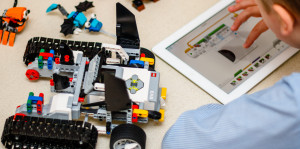“Yet another amazing day full of activities, workshops, and live panel events. Unfortunately, today was the last day of live events :(. From tomorrow, we are on our own in developing our app!”
This was the reaction of a student at the second virtual Digital Explorers technology careers series in July, organized by Tata Consultancy Services (TCS). The reaction is typical of many responses, reflecting how the once physical-first event has successfully made the jump to digital.
The ideas produced by participants, aged 16-17, show the power of virtual learning to inspire. One student proposed an app designed to help homeless people. Based around an interactive map, it would show useful features of a city − like public showers, water fountains and homeless shelters. The app would also act as an employment hub with job opportunities and live chats from professionals to help with employability.
Thanks to the online event’s success, TCS’ corporate sustainability team in the UK are now looking to the future: a goal of reaching up to 20,000 people this year through its online content archive; extending the age range of Explorers through a new bursary; and thinking of how the programme can help the UK economy recover from COVID-19.
‘A real quandary’
Since 2017, Digital Explorers events − where young people come together to learn about science, technology, engineering and mathematics (STEM) careers − have been based on face-to-face interaction.
Hundreds of TCS volunteers working with our partners, the Engineering Development Trust (EDT) and MyKindaFuture, have engaged thousands of young people aged between 12 and 17 with topics from artificial intelligence to the Internet of Things and events including talks from industry speakers and careers coaching. Last year alone, Digital Explorers reached pupils in Bristol, Manchester and Edinburgh.
It’s vital work. Not only does the programme target students from under-represented communities, it also helps tackle a serious skills gap: 60% of tech companies in the UK are struggling to fill vacancies, while STEM careers continue to experience shortages of women and diverse talent.
“When COVID emerged, we were in a real quandary,” recalls Yogesh Chauhan, TCS’ Director of Corporate Sustainability UK&I. “With lockdown we were aware that all this was about to come to a dramatic halt – impacting life chances.”
Going virtual
The team developed an ambitious solution. “We worked very hard, very quickly, pivoting to a virtual model,” says Chauhan. “We needed something all-singing, all-dancing – replicating real life.”
Thankfully, his team was able to leverage TCS’ expertise in virtual learning, using the TCS iON Digital Glass Room™ education platform which the company had already made freely available to help schools during lockdowns.
But many of the live events and activities still had to be rebuilt from scratch and it was unclear how the pressures and disruption of COVID-19 on work and family life would affect this. It was all made possible by an agile approach and willing volunteers.
“We had around 100 TCS volunteers in the UK alone,” says Camilla Carlslund, Corporate Sustainability Manager at TCS, who has overseen the virtual Digital Explorers events. “We made it easier for them at a busy time by enabling them to help a little bit whenever they could − not necessarily by taking a full day out of their calendars.”
Shifting perspectives
A similarly flexible approach was afforded to participating students, who were encouraged to prepare tasks and content before the events and given the opportunity to catch up on modules afterwards at a convenient time.
“I had feedback from a number of families with only one laptop in the house,” Carlslund recalls. “They said the flexibility was so helpful because they could take it in turns to catch up on the programmes. One mother said she did the modules herself once her son had gone to bed. She said he had talked about the videos inspiring him.”
This story − about virtual Digital Explorers events reaching out beyond their core students − reflects an expanded vision for the project. In partnership with Queen Mary University of London, the recently launched TCS Digital Explorers Bursary will provide financial assistance for up to 20 undergraduate students from low-income families. Diversity is hardwired into the scheme with it targeted at low income families and at least 50% of the recipients will be women, helping to tackle the UK’s gender imbalance within the IT sector.
“This bursary is a continuation of our mission of engagement,” says Chauhan. “We have been supporting secondary school pupils. What we didn’t have in place was help for that older group.”
As well as a financial commitment, the bursary will give recipients unique opportunities to meet like-minded professionals and even contribute to running their own masterclasses − giving back education to the next generation of Explorers.
Looking to the future
The success of the virtual Digital Explorers programme has changed perspectives. “Face-to-face interaction is always going to be more engaging for some tasks,” says Carlslund. “But we’ve also gained so many benefits this year that we’re looking at a hybrid model for the future.”
Chauhan is working to develop the reach of the scheme. “The question is, can elements of a programme like this be delivered by schools, and can we intervene at specific junctures within that where young people will benefit most?” he asks. “Can we add in topics with different dimensions, like teaching computational thinking?”
The opportunities the virtual Digital Explorers events offer have never been more needed. Apprenticeships in the UK have been squeezed by COVID-19, placing more obstacles in the way of young people, already the hardest-hit group, financially. At the same time, the wider UK economy is looking for growth opportunities.
“If a lot of companies cut back on apprenticeships there’s going to be a large STEM skills gap going forward,” says Carlslund.
“A skills gap could feed back into economic problems at a time when we’re searching for recovery. That’s why it’s extremely important for TCS to continue to work virtually.”
If this feedback from a virtual Digital Explorers participant is anything to go by, the project is making a real difference: “Great experience. I have learned many skills during the week that will be valuable no matter what career path I choose to take.”
The road ahead may be challenging, but the Digital Explorers are ready.

